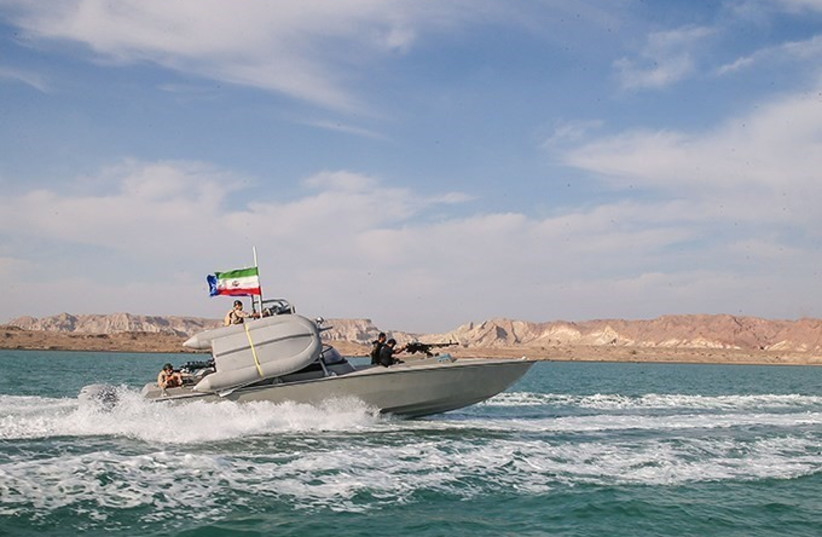Israel’s Defense Minister Benny Gantz unveiled recent satellite images showing four Iranian military ships in the Red Sea while at the Annual Economist Government Roundtable in Greece.
“Iran is expanding its aggressive operations in the region in general and in the naval arena in particular,” Gantz said, adding that it’s been “unusually” patrolling the Red Sea with its military ships.
Gantz informed the crowd that Iran has been expanding its activities in the maritime arena. “Today, we can confirm that Iran is methodically basing itself in the Red Sea, with warships patrolling the southern region,” he said.
“Today, we can confirm that Iran is methodically basing itself in the Red Sea, with warships patrolling the southern region.”
Defense Minister Benny Gantz
The defense minister shared satellite images of four Iranian military ships in the Red Sea, the “Hengam” landing ship, two different “Bandar Abbas” auxiliary ships and the “Mowj” frigate.
“The presence of Iran’s military forces in the Red Sea in recent months is the most significant in a decade,” he said. “It is a direct threat to trade, energy and the global economy.”

Iran has been working to upgrade its navy, with new vessels and submarines introduced to bolster the country’s aging fleet. The Islamic Republic has regularly harassed and attacked international shipping tankers, including oil tankers.
“Iran is a prime example of a widespread regional and global threat,” Gantz said. “It recently conducted an experiment in Semnan province with a satellite launcher, whose technology could be used to develop a long-range intercontinental missile with a range of thousands of kilometers that could also threaten Central Europe.”
The Islamic Republic, which has one of the biggest missile programs in the region, possesses thousands of short- and medium-range ballistic missiles, as well as long-range domestically-made missiles that they claim have a range of up to 2,000 kilometers. In February, it unveiled a new surface-to-surface missile with a range of 1,450 kilometers called the Kheibar Shekan.
Last week, Iran carried out the second test of the Zuljanah satellite launcher. Israel and the United States have repeatedly warned against Iran’s missile program, claiming that the missiles tested by Tehran are capable of carrying nuclear warheads.
"This test demonstrates that the Iranian regime has the capabilities to develop intercontinental ballistic missiles that may reach as far as the center of Europe,” said Gantz. “This is in addition to operational ballistic systems and UAVs that can already reach the East Med.”
In face of Iran’s continued development of long-range missiles, Israel has been working to develop several missile defense systems – including the Arrow 3, one of the joint programs between Israel and the United States. Arrow 3 was co-managed by the US Missile Defense Agency and IMDO, a division of the Israeli Defense Ministry.
Regarding Hezbollah, Gantz said that the Israel Navy and the Israel Air Force intercepted three UAVs launched from Lebanon towards the Karish gas rig in Israel’s territorial water “in order to sabotage the negotiations that are taking place on the maritime border between Israel and Lebanon.”
That event, he said “is in fact an attack on Lebanese citizens, who face extreme economic hardship,” and “shows that Hezbollah is an extension of the Ayatollahs regime - operating to destabilize the region and to cause miscalculations.”
Israel, Gantz warned, is monitoring the region and will act forcefully to defend its citizens and interests and target those who threaten or carry out attacks.
“At the same time, we are ready to work together with partners and build stability and prosperity in the area,” he added.
Gantz also touched on the war in Ukraine, saying that it has a “butterfly effect” on not only those who are directly involved, but on people across the world.
“As the war in Ukraine rages on, we learn that each country must be able to defend itself. Each country must plan ahead, investing in force build-up and coordinating between the strategic and operational levels,” he said, adding that “the war also reminds us that security cooperation is vital for regional and global stability – whether it’s in Europe, the Eastern Mediterranean, or the Middle East.”
Israel, Greece, Cyprus defense ministers meet
Earlier in the day, Gantz met with his Greek and Cypriot counterparts on the sidelines of the conference.
During his discussion with Cyprus’s Defense Minister Charalambos Petrides, they “covered challenges of mutual interest in the East-Med and areas of cooperation that are critical for the security of our citizens and for the peace and stability in the region.”
With Greece’s Defense Minister Nikolaos Panagiotopoulos, Gantz said that the two discussed “increasing cooperation between the [countries’] military industries, and additional challenges we are facing, first and foremost the Iranian threat.”
